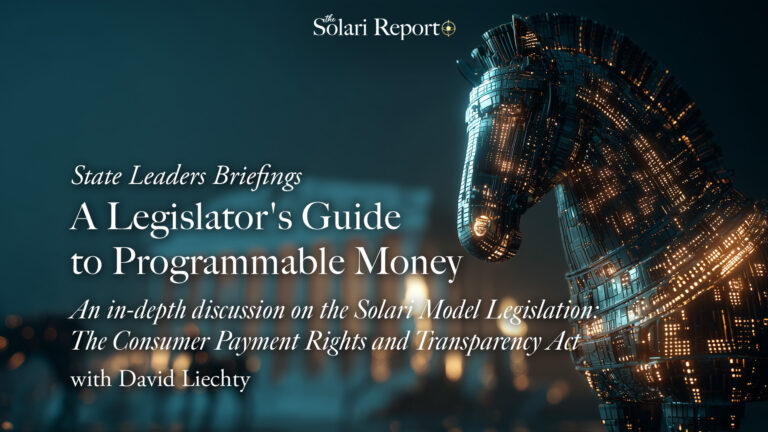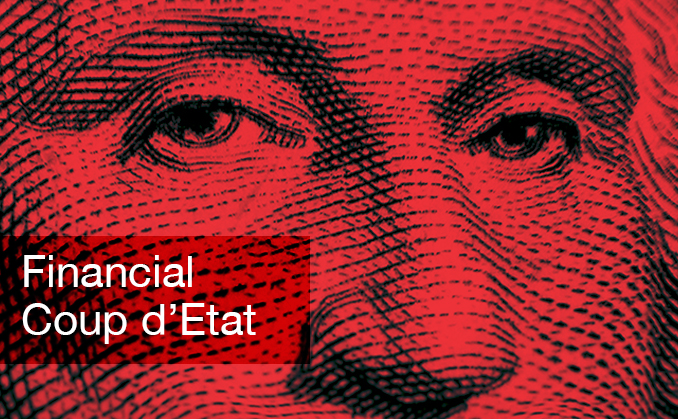In light of recent events, I am republishing.]
By Catherine Austin Fitts
In the fall of 2001 I attended a private investment conference in London to give a paper, The Myth of the Rule of Law or How the Money Works: The Destruction of Hamilton Securities Group.
The presentation documented my experience with a Washington-Wall Street partnership that had:
- Engineered a fraudulent housing and debt bubble;
- Illegally shifted vast amounts of capital out of the U.S.;
- Used “privitization” as a form of piracy – a pretext to move government assets to private investors at below-market prices and then shift private liabilities back to government at no cost to the private liability holder.
Other presenters at the conference included distinguished reporters covering privatization in Eastern Europe and Russia. As the portraits of British ancestors stared down upon us, we listened to story after story of global privatization throughout the 1990s in the Americas, Europe, and Asia.
Slowly, as the pieces fit together, we shared a horrifying epiphany: the banks, corporations and investors acting in each global region were the exact same players. They were a relatively small group that reappeared again and again in Russia, Eastern Europe, and Asia accompanied by the same well-known accounting firms and law firms.
Clearly, there was a global financial coup d’etat underway.
The magnitude of what was happening was overwhelming. In the 1990’s, millions of people in Russia had woken up to find their bank accounts and pension funds simply gone – eradicated by a falling currency or stolen by mobsters who laundered money back into big New York Fed member banks for reinvestment to fuel the debt bubble.
Reports of politicians, government officials, academics, and intelligence agencies facilitating the racketeering and theft were compelling. One lawyer in Russia, living without electricity and growing food to prevent starvation, was quoted as saying, “We are being de-modernized.”
Several years earlier, I listened to three peasant women describe the War on Drugs in their respective countries: Colombia, Peru, and Bolivia. I asked them, “After they sweep you into camps, who gets your land and at what price?” My question opened a magic door. They poured out how the real economics worked on the War on Drugs, including the stealing of land and government contracts to build housing for the people who are displaced.
At one point, suspicious of my understanding of how this game worked, one of the women said, “You say you have never been to our countries, yet you understand exactly how the money works. How is this so?” I replied that I had served as Assistant Secretary of Housing at the US Department of Housing and Urban Development (HUD) in the United States where I oversaw billions of government investment in US communities. Apparently, it worked the same way in their countries as it worked in mine.
I later found out that the government contractor leading the War on Drugs strategy for U.S. aid to Peru, Colombia and Bolivia was the same contractor in charge of knowledge management for HUD enforcement. This Washington-Wall Street game was a global game. The peasant women of Latin America were up against the same financial pirates and business model as the people in South Central Los Angeles, West Philadelphia, Baltimore and the South Bronx.
Later, courageous reporting by several independent investigative reporters confirmed in detail that the privatization and economic warfare model I discussed in London had deep roots in Latin America.
We were experiencing a global “heist”: capital was being sucked out of country after country. The presentation I gave in London revealed a piece of the puzzle that was difficult for the audience to fathom. This was not simply happening in the emerging markets. It was happening in America, too.
I described a meeting that had occurred in April 1997, more than four years before that day in London. I had given a presentation to a distinguished group of U.S. pension fund leaders on the extraordinary opportunity to re-engineer the U.S. federal budget. I presented our estimate that the prior year’s federal investment in the Philadelphia, Pennsylvania area had a negative return on investment.
We presented that it was possible to finance places with private equity and re-engineer the government investment to a positive return and, as a result, generate significant capital gains. Hence, it was possible to use U.S. pension funds to significantly increase retirees’ retirement security by successfully investing in American communities, small business and farms — all in a manner that would reduce debt, improve skills, and create jobs.
The response from the pension fund investors to this analysis was quite positive until the President of the CalPERS pension fund — the largest in the country — said, “You don’t understand. It’s too late. They have given up on the country. They are moving all the money out in the fall [of 1997]. They are moving it to Asia.”
Sure enough, that fall, significant amounts of moneys started leaving the US, including illegally. Over $4 trillion went missing from the US government. No one seemed to notice. Misled into thinking we were in a boom economy by a fraudulent debt bubble engineered with force and intention from the highest levels of the financial system, Americans were engaging in an orgy of consumption that was liquidating the real financial equity we needed urgently to reposition ourselves for the times ahead.
The mood that afternoon in London was quite sober. The question hung in the air, unspoken: once the bubble was over, was the time coming when we, too, would be “de-modernized?”
In 2009 — more than seven years later — this is a question that many of us are asking ourselves.
Part II: Rethinking Diversification
Related Reading:
Dillon, Read & Co. Inc. and the Aristocracy of Stock Profits





















































































































Financial Coup d’Etat at The Catherine Austin Fitts Blog great artice thankyou
..
Below are some members of the CFR. Judge for yourself if they are involved in running our government:
1952 *Eisenhower and *Stevenson
1956 *Eisenhower and *Stevenson
1960 *Kennedy and *Nixon
1964 Johnson and Goldwater
1968 *Humphrey and *Nixon
1972 *McGovern and *Nixon
1976 *Carter and *Ford
1980 Reagan and *Carter
1984 Reagan and *Mondale
1988 *Bush and *Dukakis
1992 *Clinton and *Bush
1996 *Clinton and *Dole
2000 *W Bush and *Gore
2004 *W Bush and *Kerry
2008 *Obama and *McCain
It really didn’t matter which candidate won those elections ..did it?
Former Deputy Secretary of Defense *John White
Former State Department official *Wendy Sherman.
Former Deputy to National Security Adviser *Sandy Berger
Former Treasury Secretary *Robert Rubin,
Former Defense Secretary *William Perry,
Former Secretary of State *Madeleine Albright,
and some currently work at consultancies run by those Clinton administration principals.
Others are old Obama allies who also have Clinton ties, like
*Michael Froman, a transition adviser who was Obama’s
classmate at Harvard Law School and served as Robert Rubin’s
chief of staff at the Clinton Treasury Department, and
*Christopher Edley, who taught Obama at Harvard
* Tim Geithner, Secretary if the Treasury
*Bill Richardson, Secretary of Commerce
*Hillary Clinton Secretary of State
All the above denoted with a * are or were members of The Council on Foreign Relations (CFR)
as are the Financial Institutions big wigs and the banks and about 90% of Obamas Administration are also members as is V.P. Biden and his staff.
All the Chiefs of Staff, the media, both print and T.V. and the Deans and Professors at our
Universities are also dominated by members of the CFR which explains the dumbing down of the
children.
There is also a good list of U.S.Congressmen and Senators who are members of the CFR and the
Trilateral Commission.
THE FIRST 10 AMENDMENTS TO THE CONSTITUTION AS RATIFIED BY THE STATES
Amendment I
Congress shall make no law respecting an establishment of religion, or prohibiting the free exercise thereof; or abridging the freedom of speech, or of the press; or the right of the people peaceably to assemble, and to petition the Government for a redress of grievances.
Amendment II
A well regulated Militia, being necessary to the security of a free State, the right of the people to keep and bear Arms, shall not be infringed.
Amendment III
No Soldier shall, in time of peace be quartered in any house, without the consent of the Owner, nor in time of war, but in a manner to be prescribed by law.
Amendment IV
The right of the people to be secure in their persons, houses, papers, and effects, against unreasonable searches and seizures, shall not be violated, and no Warrants shall issue, but upon probable cause, supported by Oath or affirmation, and particularly describing the place to be searched, and the persons or things to be seized.
Amendment V
No person shall be held to answer for a capital, or otherwise infamous crime, unless on a presentment or indictment of a Grand Jury, except in cases arising in the land or naval forces, or in the Militia, when in actual service in time of War or public danger; nor shall any person be subject for the same offence to be twice put in jeopardy of life or limb; nor shall be compelled in any criminal case to be a witness against himself, nor be deprived of life, liberty, or property, without due process of law; nor shall private property be taken for public use, without just compensation.
Amendment VI
In all criminal prosecutions, the accused shall enjoy the right to a speedy and public trial, by an impartial jury of the State and district wherein the crime shall have been committed, which district shall have been previously ascertained by law, and to be informed of the nature and cause of the accusation; to be confronted with the witnesses against him; to have compulsory process for obtaining witnesses in his favor, and to have the Assistance of Counsel for his defence.
Amendment VII
In suits at common law, where the value in controversy shall exceed twenty dollars, the right of trial by jury shall be preserved, and no fact tried by a jury, shall be otherwise reexamined in any Court of the United States, than according to the rules of the common law.
Amendment VIII
Excessive bail shall not be required, nor excessive fines imposed, nor cruel and unusual punishments inflicted.
Amendment IX
The enumeration in the Constitution, of certain rights, shall not be construed to deny or disparage others retained by the people.
Amendment X
The powers not delegated to the United States by the Constitution, nor prohibited by it to the States, are reserved to the States respectively, or to the people.
Exploring Constitutional Law
Catherine,
I may have to move into a Section 8 HUD housing……I’m on Soc.Sec…….there sure are doing alot of checking into everything about me! Which is OK. But, I’m not so sure I want to go under the control of the government housing at this time in my life. Plus, what if I do go back to work somehow, somewhere, if I earn too much will they just increase my rent or would they make me payback the vouchers? Your the HUD lady…please advise…..I just checked out all our Scoope comments, love it! Jan
There is no “claw back” provision in Section 8 housing that would go back and recover money from earlier periods just because you have earned more in later periods. This assumes that you have accurately reported your income as required. When your income increases above certain levels, your rent increases on a going-forward basis. I can’t quote the percentages off the top of my head. There actually are some people who do not qualify for Section 8 (because they earn too much) but who chose to live in Section 8 housing. They just pay the full market rate.
I am assuming everyone has seen this?:
http://news.yahoo.com/s/ap/20090422/ap_on_bi_ge/us_freddie_mac_official_dead
Check this, maybe interesting to read (bailouts are wrong headed by Gordon Ringoen):
http://www.prudentbear.com/index.php/featuredcommentaryview?art_id=10207
Ricardo